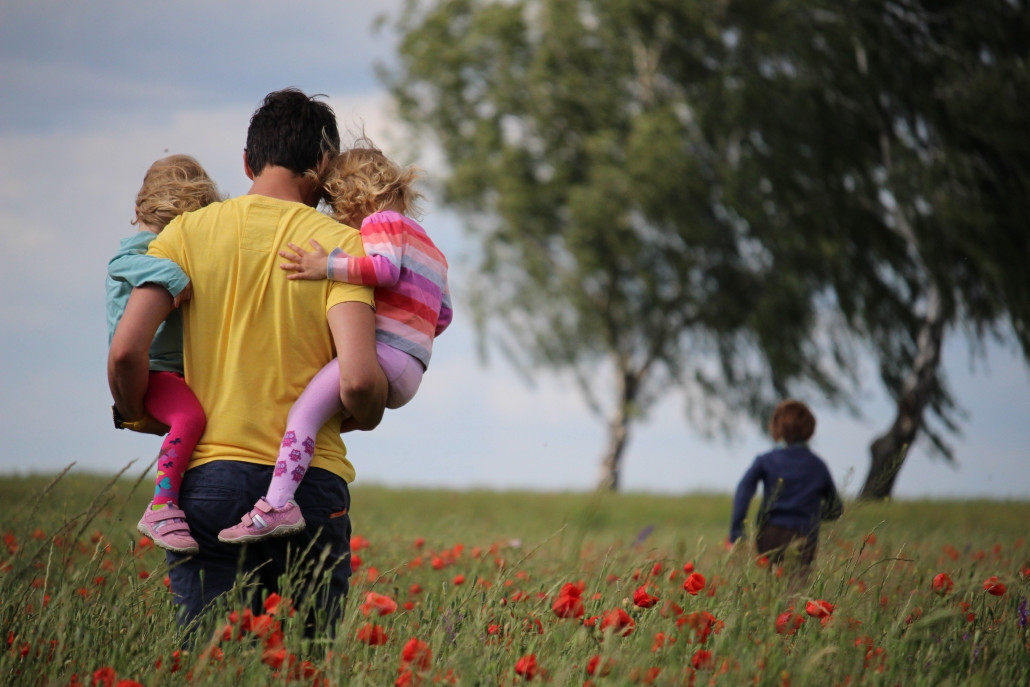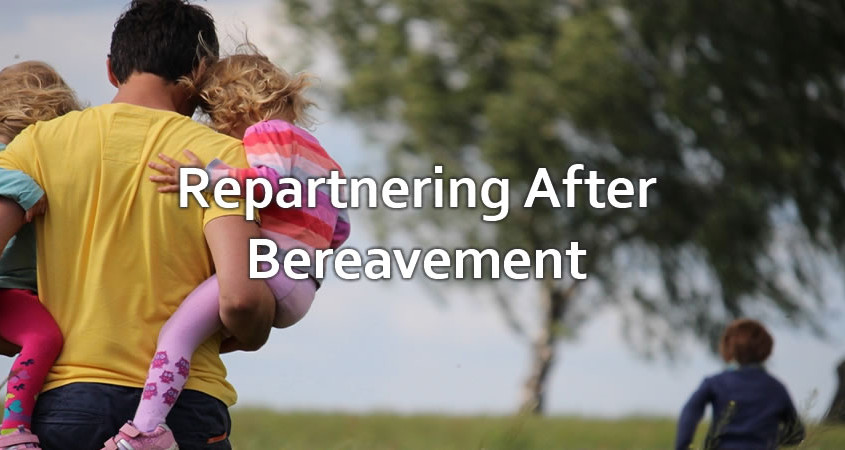Repartnering After Bereavement
 In my large extended family, we could always count on at least one aunt to produce an annoying platitude about relationships. Anyone excited about announcing their engagement would be told “many a slip twixt the cup and the lip.” If the engagement took place relatively early in the relationship, joy would be dampened with the admonition “marry in haste and repent at leisure.” It’s a wonder any of us ever braved the path into matrimony.
In my large extended family, we could always count on at least one aunt to produce an annoying platitude about relationships. Anyone excited about announcing their engagement would be told “many a slip twixt the cup and the lip.” If the engagement took place relatively early in the relationship, joy would be dampened with the admonition “marry in haste and repent at leisure.” It’s a wonder any of us ever braved the path into matrimony.
I never got to hear their pronouncements about marriage after bereavement, but I’m sure it would have been an even stronger dose of questionable wisdom. Still, I have to admit that many platitudes, annoying and patronising as they might be, often contain a grain of truth.
Let’s think for a moment about bereavement. Interfering aunts aside, what truths do we know? We know that raw grief makes all of us regress. Internally, we have a feeling of vulnerability similar to that of an 8-15year old, younger if we experienced trauma, abuse, neglect or grief in our early life. From this perspective, our frontal lobes, the part of our brain responsible for higher order thinking, aren’t functioning at maximum efficiency, a good reason for postponing major decisions. Wisdom suggests we should wait until we are well past the first anniversary of the death of someone central to our lives.
What major decisions are we talking about? Broadly speaking, moving house or country, changing jobs, ending friendships, having another baby, investing money and re-partnering. I’m sure there are many more.
Anxiety – about the future, our ability to cope, the responsibility of caring for others, earning a living, the fear of someone else dying, can be overwhelming. Fortunately, we are still able to do some things on automatic pilot while we wait for the rational functions of our frontal lobes to return to normal. In the meantime, most of us need help. We need an advocate to encourage us to slow down, to take deep breaths, to keep putting one foot after the other. We need reassurance that we will eventually feel competent again.
Waiting for the prescribed year or so to pass can feel like torture, so it’s no wonder that re-partnering quickly can seem like a good solution. For some folk, it can be, but it’s a risk. A big risk. Occasionally, that big risk pays off.
My grandfather remarried eight months after his first wife died while giving birth to their third child. Raw with grief, he struggled to care for a new baby and two small children while trying to earn a living. A proud and independent man, he knew there would be a limit to how long he could allow himself to depend on the benevolence of neighbours and local church members. There were no social services in those days, no financial help. His solution was to marry a young, local woman who was prepared to take on the responsibility of a grieving man and three small children.

My grandmother was small – less than five feet tall – but a powerhouse of energy. She not only cared for three step-children, but proceeded to produce eight of her own, and somehow made family life happy, despite the inevitable chaos created by a household of eleven children. My grandparents grew to love each other deeply, and they loved their children, all eleven of them, without showing favour to the first or the second family. Somehow, they mostly managed to get it right, despite the odds against them.
My sisters and I loved hearing our father’s descriptions of his early home life. According to him, the children were never lonely, there was always someone to play with, and always an older child to help with a new baby. Like most children in those days, my father and his siblings roamed the countryside, got up to hair-raising adventures, and only returned home for meals. Each time I try to imagine that tiny woman washing for 13 people (no washing machines in those days), preparing meals, making beds, cleaning the house, mediating conflict, looking after sick children and being a good wife, I feel utterly exhausted. As much as she loved everyone, surely there would have been times when she was tempted to run for the hills?
Times have changed. Families are usually smaller. Modern conveniences may make housework easier, but the time spaces created are used up by the demands of modern living. Child safety is an issue. Work safety is an issue. Every day, media reports increase the list of things for parents to worry about – alcohol, drugs, fast cars, underage sex, pornography, rape, the internet, screen addiction, truanting, violence, youth suicide, natural disasters, and terrorist attacks. Not surprisingly, the relatively relaxed parenting style of my grandmother’s generation has been replaced with helicopter parenting, a style which is time and energy consuming, and often a precursor to family anxiety and conflict. Anxious parents try to set and maintain boundaries, and kids test the limits.
Add to all of that the social pressure on all of us to succeed – financially, academically, in sport – in fact, in almost every aspect of life. It’s hard to relax, and it usually takes two working parents to sustain the demands of family, school and social life. There is little respite from stress. The morning rush – everyone up, dressed, fed, dropped at the bus stop, pre school, or school; the evening rush – dinner, baths, the dreaded homework, getting everyone to bed, preparing for the next day. The weekend rush – sport, hobbies, lessons, shopping, laundry, housework and so on. Feeling tired yet?
What happens then in single parent families? The wheels come off when all responsibility falls on one pair of shoulders. Whether sole parenting is the result of separation, divorce or death, the ensuing chaos is usually pretty similar – a time when we all need help. From my role as a marriage and family therapist, as a bereavement specialist, and from personal experience, I understand the grief that is involved in all of these situations, but for the purpose of this article I’ll focus on death related loss and grief.
Repartnering after Bereavement
If possible, it’s best to wait for at least 13-15 months, ideally two years before repartnering. After thirteen months, we will hopefully have convinced ourselves that we are capable of surviving, even if survival still doesn’t seem very desirable. Somehow, we have gotten through one of everything – birthdays, anniversaries, and times of religious or social celebration. One weary foot after the other.
When we re-partner early in our grief, we run the risk of choosing someone who takes care of the regressed and vulnerable part of ourselves, someone we might hope will fill the empty space in our heart. Once we find ourselves on a firm footing again, our needs may have changed, and ‘the chosen one’, seen through different eyes, might seem annoyingly solicitous, controlling, or needy. Empty spaces are best carried by new life, new interests, not artificially filled in an attempt to end pain. We certainly need help, preferably the kind of compassionate understanding and support that is given by folk who don’t have a hidden agenda.
The right kind of support, given in the right way at the right time, slowly helps us regain a firm footing in life. Initially, we may have moments of respite from grief, like tiny bubbles in lemonade, perhaps followed by feelings of slipping backwards. Then gradually, step by painful step, a mixture of courage, support, and life itself help us to experience respite for longer periods.
Learning to live with grief isn’t a linear process – it’s all over the shop. Sometimes moments of respite from grief make us feel guilty. Didn’t I love this person as much as I thought? Are they slipping further and further away? Will all my memories of them disappear? We unconsciously, yet creatively, answer those questions for ourselves by finding ways to re-stimulate the pain of grief, reassurance that we are still connected and always will be, that we are still able to love in absence.
Sexual feelings re-surface – nature’s way of reminding us we are alive and need to be IN life. We may risk dating, perhaps initially feeling guilty when we enjoy intellectual, emotional, physical and spiritual connection. We may dare to hope for and imagine a future – a shared life to look forward to.
Successful Repartnering when Children are Involved

When do we tell the children? How do we tell the children?
We need to ask ourselves a few searching questions before we bring our children into the equation. Do I really know the person I want them to meet? Do I have any misgivings about them? What do I like about them? Are they mature enough not to be threatened by the love I still have for my dead partner? By the children’s ongoing connection to their dead parent? Do I have any misgivings about my children’s behaviour?
Questions answered, take a deep breath and remind yourself of the mantra frequently quoted at ‘A Friend’s Place’ – safety, truth and inclusion works best. Make children feel safe always – emotionally and physically. Safety taken care of, WHAT truth do I tell them? WHEN, WHERE, and HOW? You may have already told your children about going on dates, and hopefully kept it light, but it’s not a good idea to introduce children to everyone you go out with, raising their anxiety unnecessarily.
Introduce your potential partner WHEN it seems as though the relationship might have a future. Then take it slowly, one step at a time, initially keeping expectations low. Introduce the subject when you are in a place WHERE the children feel comfortable and relatively in control.
The HOW might be telling them something like “I’ve met X who has become a good friend, and I’d like you to meet them. When you do, I expect you to be polite and treat them with respect, just as I treat your friends. Later, when we’re on our own, you can ask me any questions you like and I’ll answer honestly.”
We can’t expect our children to fall in love with someone simply because we have – like and respect is all we can hope for.
Any new person – no matter how appealing – is a confrontation and potential threat. Their very existence forces a child to confront reality and lose hope – hope that their deceased parent will be resurrected; or hope that they will have their surviving parent to themselves – forever. They may fear the new person will try to take their dead parent’s place, not let them be spoken about, and try to eradicate precious memories. They may fear being forced to call the new person mum or dad, something that’s only ever a good idea if it happens naturally. Better to find a name that sits comfortably for everyone.
From the Mouths of Babes – Reparenting Tips to Potential New Partners from Children at ‘A Friend’s Place’
Make us feel important.
- Get to know us – slowly. Find out what we’re interested in.
- When we’re out as a family, don’t go all mushy with our parent and make us feel left out.
- Don’t sleep in my parent’s bed.
- Don’t ask us to put photos of our parent away.
- Don’t ask us to call you mum or dad.
- Don’t try to be the boss.
- Don’t try to act like you’re our parent. Be our friend.
- We’ll treat you with respect if you treat us with respect.
Note:
Children may be ambivalent at first, or never fully accept your new partner. That doesn’t mean that the relationship can’t work, but it does mean that there will need to be some very mature adults in the new family constellation to prevent ambivalence becoming intense dislike, sabotage, or combat.
Help
Help is always available – at ‘A Friend’s Place’ or by contacting our outreach service.
Dianne McKissock OAM
NCCG Outreach Support Service
Email support for dying and bereaved people and anyone involved in their care





